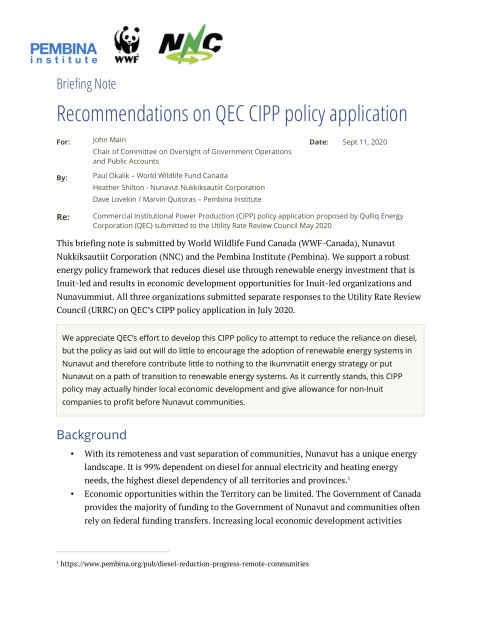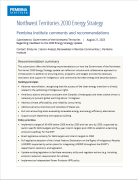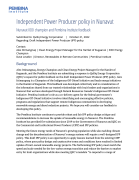This briefing note was submitted by World Wildlife Fund Canada, Nunavut Nukkiksautiit Corporation and the Pembina Institute in response to the Qulliq Energy Corporation's Commercial Institutional Power Production (CIPP) policy proposal submitted to the Utility Rate Review Council May 2020.
While we appreciate QEC’s effort to develop this CIPP policy to attempt to reduce the reliance on diesel, the policy as laid out will do little to encourage the adoption of renewable energy systems in Nunavut and therefore contribute little to nothing to the Ikummatiit energy strategy or put Nunavut on a path of transition to renewable energy systems. As it currently stands, this CIPP policy may actually hinder local economic development and give allowance for non-Inuit companies to profit before Nunavut communities.
Recommendations around the CIPP policy
The Government of Nunavut should work with QEC on the following changes to the CIPP policy:
- Promote Inuit ownership in renewable energy projects – This policy currently does not mandate any aspect of Inuit-led projects or the creation of local jobs and employment.
- Develop community-specific PPA price – IPPs should be compensated at a varying rate depending on the variable costs in each community.
- PPA rate should be much higher – The PPA rates should be increased to between $0.50 and $0.62 per kWh. A fair PPA rate would reflect cost savings to QEC, the GN and possibly the federal government including avoided operational and maintenance costs.
- Include technical aspects – The policy should include “adders” for battery energy storage technologies, and must mandate grid reliability and define the interconnection process.
Complementary to this CIPP policy, the GN could offer rebates or incentives to support the capital investment necessary to develop these projects.
Other resources
- First set of Pembina Institute recommendations (March 2019) to QEC to consider as they began developing their IPP policy
- Pembina Institute response and further set of recommendations to the URRC on the CIPP portion of the QEC policy submission (July 2020)
- Recommendations to the Government of Nunavut to accelerate clean energy projects offers seven recommendations on how to improve policies so that they can accelerate the development of Inuit-led clean energy projects (February 2022)







